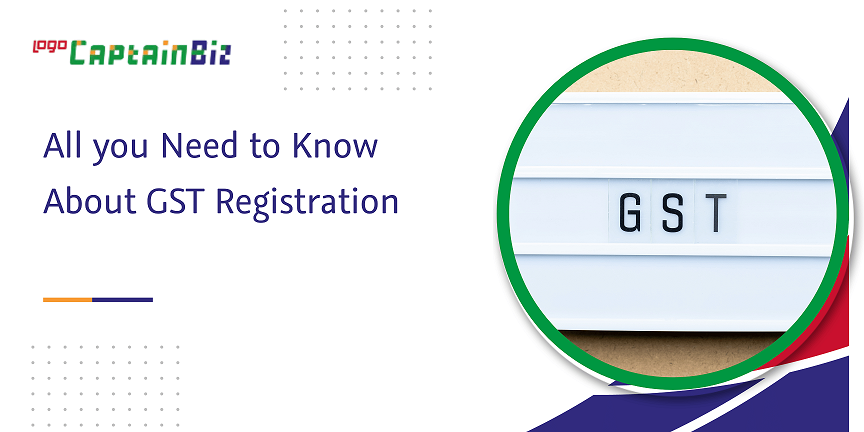Taking Full Advantage Of Tax Effectiveness: Professional Tips on Navigating the GST Enrollment Puzzle for Tiny Organizations
Browsing the complex landscape of Product and Solutions Tax (GST) enrollment can be a labyrinthine job for local business intending to optimize their tax efficiency. Understanding the qualification standards, careful documentation requirements, strategic timing considerations, and proficient registration process tips can significantly influence a business's financial standing. Conformity with GST policies is paramount, and sticking to finest practices can enhance operations and protect against prospective pitfalls. In this conversation, we will discover skilled insights and workable advice that can encourage little organizations to browse the GST registration labyrinth efficiently and optimize their tax obligation performance.
Eligibility Requirements
Qualification demands for Local business GST Registration include particular criteria that companies need to satisfy to conform with tax laws. To certify for GST enrollment, a company needs to have a yearly turn over going beyond the threshold set by the tax authorities, which varies by country. Furthermore, organizations included in inter-state supply of solutions or items, or those selling goods online, might be called for to register for GST, regardless of their turn over. It is necessary for services to accurately establish their qualification based on these turnover limits to prevent fines for non-compliance. Singapore GST Registration.

Documentation Needs
The called for documentation commonly includes evidence of company enrollment or identity, address and incorporation evidence of the company owner, photos, financial institution account information, and evidence of the principal place of service. Furthermore, businesses need to supply information of their organization tasks, including the goods or services supplied.
Keeping all essential paperwork organized and conveniently accessible can simplify the registration process and aid companies abide with the demands successfully. Careful interest to information and adherence to the paperwork standards are important for a successful GST enrollment process for tiny companies.
Timing Factors To Consider
Thinking about the important documents requirements have actually been carefully resolved, the next critical aspect for local business starting the GST registration process is the critical administration of timing factors to consider. Timing plays a pivotal role in GST enrollment, influencing not only compliance yet also financial aspects of the organization. Local business require to carefully prepare the timing of their GST enrollment to take full advantage of advantages and minimize potential risks.

Additionally, services need to line up the timing of their GST enrollment with their functional preparedness. Appropriate preparation, such as updating audit systems and training personnel, is vital to perfectly integrate GST demands right into day-to-day operations. By strategically handling timing considerations, small companies can navigate the GST enrollment process successfully and optimize their tax efficiency.
Enrollment Refine Tips
Efficiently navigating the GST registration process requires small companies to execute proactive and calculated registration procedure suggestions. One critical pointer is to ensure all required files are conveniently offered before starting the registration procedure. This consists of company enrollment documents, proof of address, financial institution declarations, and recognition evidence of the company owners. Validating the accuracy of the information supplied is just find out here now as crucial to stop delays or denials.
Additionally, recognizing the thresholds and requirements for GST enrollment based upon the particular state or territory where the business runs is important. Some states have different turnover limits that cause mandatory registration, so being educated about these thresholds can aid organizations plan in advance.
Another important pointer is to think about seeking specialist assistance from accounting professionals or tax experts that concentrate on GST enrollment. Their experience can enhance the process, lower errors, and make certain conformity with all policies.
Conformity Finest Practices
Navigating the GST registration procedure efficiently necessitates not just critical registration procedure suggestions yet likewise thorough adherence to compliance finest practices to ensure ongoing governing placement. Small companies have to focus on link compliance to avoid fines and keep a great standing with tax authorities. One essential best practice is to maintain in-depth and precise records of all purchases. This consists of invoices, invoices, and other financial records that may be required for tax obligation audits or compliance checks. Additionally, staying educated concerning any updates or modifications to GST regulations is important. Small company proprietors ought to routinely assess government standards and seek professional guidance if required to ensure they are meeting all needs. It is likewise suggested to submit GST returns in a timely manner to prevent late charges and charges. By integrating these conformity finest techniques into their operations, local business can browse the intricacies of GST registration with confidence and performance.
Final Thought
In conclusion, small companies can browse the GST enrollment maze by ensuring they meet eligibility criteria, gather required documentation, consider timing implications, follow registration procedure pointers, and comply with conformity finest methods. By optimizing tax obligation effectiveness with proper GST registration, businesses can boost their economic monitoring and procedures.
Navigating the elaborate landscape of Goods and Services Tax Obligation (GST) enrollment can be a labyrinthine task for small organizations intending to maximize their tax performance.Qualification demands for Small Business GST Enrollment include particular criteria that organizations need to satisfy to comply with tax obligation policies. The required documents normally includes evidence of service registration or address, incorporation and identification proofs of the organization owner, pictures, bank account information, and proof of the major place of organization. Furthermore, organizations require to provide information of their business tasks, consisting of the services or products provided.Effectively browsing the GST registration process calls for small services to apply calculated and aggressive registration procedure pointers.